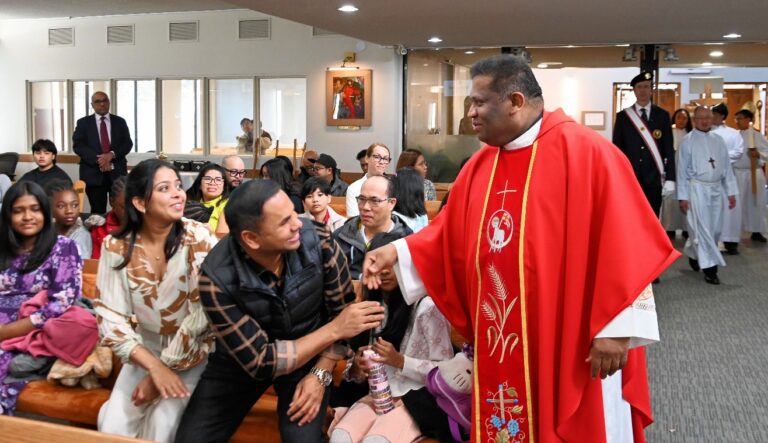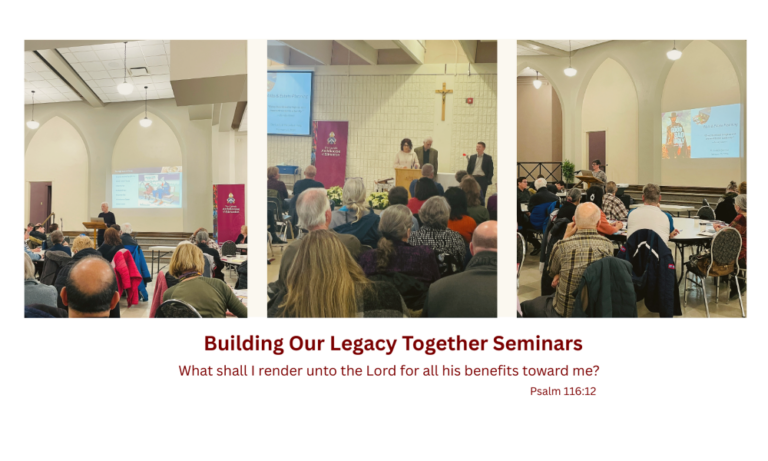Since it’s wedged between the second story of creation (Genesis 2) and the fall of humanity (Genesis 3), we sometimes miss the importance of Genesis 2:25. There we read that our first parents were “…naked and were not ashamed.” This passage speaks to the original experience of Adam and Eve from the beginning. They felt so secure with one another that they could be vulnerable in every conceivable way. This changed quickly once sin entered the story. At that moment, they recognized that they were naked (Genesis 3:7) and hid because they were afraid (Genesis 3:10). St. John Paul II described what happened between them in one of his presentations on the Theology of the Body, stating that “ …the original capacity of communicating themselves to each other, which Genesis 2:25 speaks of, has been shattered.” The way in which Adam and Eve related to each other, even the way they saw each other was affected by sin. While on the outside, they looked the same, something has changed inside of them. It\’s in this context that we should understand the Ninth Commandment, You shall not covet your neighbour’s wife:
“The Ninth Commandment forbids, not desires per se, but rather disordered desires. The ‘covetousness’ against which Sacred Scripture warns is the rule of impulses over the mind, the dominion of urges over the whole person, and the sinfulness that that causes.” -YouCat 462
The key is the distinction YouCat makes between desires and disordered desires. Human beings crave all sorts of relationships. Many of us long to love and to be loved exclusively by another, and most of us (though not all of us) are called to the Sacrament of Marriage. And both the desire and the calling to love like this is something good. What is not good is when these desires become disordered, and that desire to love is twisted into a desire to possess or to use. In these moments our desire for love is replaced by its counterfeit which we call lust. Love is selfless while lust is selfish. Love empties itself out for the sake of the other, while lust is always looking for more because it can never be satiated. Love asks, “what can I do for my beloved,” while lust asks “what can/does that person do for me?
 Jesus said: “You have heard that it was said, ‘You shall not commit adultery.\’ But I say to you that everyone who looks at a woman lustfully has already committed adultery with her in his heart” (Matthew 5:27-28). It’s in this way that the 9th Commandment builds upon the 6th Commandment. Not committing adultery speaks clearly of what we shouldn’t do with our bodies. Not coveting our neighbor’s wife speaks of what we should do in our hearts, and so we find ourselves in a battle with lust that takes place in our hearts, our eyes, and our thoughts.
Jesus said: “You have heard that it was said, ‘You shall not commit adultery.\’ But I say to you that everyone who looks at a woman lustfully has already committed adultery with her in his heart” (Matthew 5:27-28). It’s in this way that the 9th Commandment builds upon the 6th Commandment. Not committing adultery speaks clearly of what we shouldn’t do with our bodies. Not coveting our neighbor’s wife speaks of what we should do in our hearts, and so we find ourselves in a battle with lust that takes place in our hearts, our eyes, and our thoughts.
The first and primary battle takes place in the heart. Jesus says that “where your treasure is, there will your heart be also” (6:21). What is it that we desire? Do we want to give ourselves to another or do we lose ourselves in fantasy about another person(s)? Given the sensual society we live in, it should be no surprise that even faithful Christians struggle in this area, and so we need to ask God to bring about a change within us:
“When we turn to God with a sincere intention, he transforms our hearts. He gives us the strength to correspond to his will and to reject impure thoughts, fantasies, and desires.” -YouCat 463
We need to get on our knees every day and ask for God’s help to live a life driven by love and not by lust. We are blessed, however, as the Church has many patrons of purity and prayers for pure heart – lean on this legacy as you approach this first battlefield.
The second battle ground is that of the eyes. This battleground is important, because what we take in through our eyes has a profound effect on us. There’s a phrase you’ll hear around the Church about our need to keep custody of our eyes. In other words, we need to be in control of the things we look at. If we stare and gawk at people or spend time viewing pornography, it shapes our hearts and our minds. It impacts how we see the body and the gift of loving intimacy. Sirach 9:8 offers real practical advice here, telling us to “avoid looking intently at the beauty that belongs to another.” Keeping custody of our eyes means we shouldn’t stare at someone we believe to be good looking or try to steal that second glance when we think they aren’t looking. It involves looking away when we see something immodest. It means being deliberate in what shows we watch (and choosing at times not to watch some shows if they have a negative impact on us.) It means we need to avoid allowing pornography to take root in our lives. These are all ways we can keep the custody of our eyes.
Finally, we need to consider the battleground of our minds. It often seems like things fly through our brains unsolicited every day, including inappropriate and lustful thoughts. The battle is not about how the thoughts get in there, but rather what we do when we realize what’s happened. Do we entertain a thought of lust towards this person or do move on from it? We need to choose not to embrace the ones that lead you to covet any other human being – particularly those who are not your spouse. (Side note: when we work at loving a spouse, we naturally learn to see and love the beauty rather than wanting to ‘use’ them for any reason. It’s just in the nature of love… but that’s another post for another time.) Consider this: St. Luke writes that the things we say in secret will be proclaimed from the housetops (see Luke 12:3). Ask yourself how would the individual you are fantasizing about feel if they knew what you were really thinking? Most likely you would feel ashamed, something that can help us in this battle:
“Shame safeguards a person’s intimate space: his mystery, his most personal and inmost being, his dignity, but especially his capacity for love and sexual self-giving… [it] protects something valuable, namely, the dignity of the person in his capacity to love” (YouCat 464).
The 9th Commandment tells us not to look at others with lust in our hearts. This is a battle we face on several fronts: our hearts, our eyes, and our minds. To live up to this commandment, we need to ask God’s help, we need to keep good custody of our eyes, and we need to be mindful of our thoughts. All of this is easier said than done. If you fall – as many of us do – don’t beat yourself up. Get up and start over again – using the Sacrament of Reconciliation as often as you need it (that’s why it’s there) – and learn to live. Recognize the battle you fight against lust, and that though it will at times seem hard or overwhelming, it will also absolutely be worth it because it frees us to love as God intended us to.
If you are looking for extra help in the areas of lust or pornography addiction, there is help out there! Two good resources you might start with are Jason Evert’s Chastity Project website and Dr. Peter Kleponis’ Integrity Restored program.
-Mike Landry is Catholic Youth Camps director for the Archdiocese of Edmonton. He is also chaplain for Evergreen Catholic Schools, serving 10 schools west of Edmonton. Mike and his wife Jennifer live in Stony Plain with their five children.




